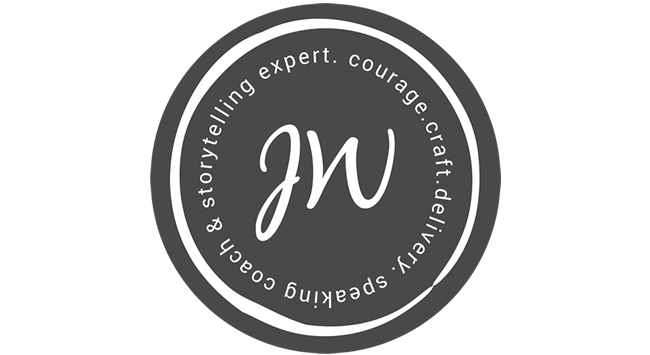Getting negative feedback isn’t the end
May 1st, 2020

One of the biggest reasons people don’t take the leap and get on stage to speak is because they’re afraid of negative feedback.
What will people think of me? Will they judge me if I mess up? What if people laugh at me? Or discover what an imposter I am? What if I fall flat on my face and people share my failure all over social media?
When I hear those kinds of worries from my clients — and from myself — I usually say “YES! Any of those things COULD HAPPEN, and probably will at some point in your speaking life, so what if?”
What’s it to you?
So what if someone thinks those things?
So what if someone judges you?
It’s actually none of your business. It’s their business. Their problem. Their bad day.
YES serve your audience. Be relevant. Pay attention to what they need and what truly serves them.
But when the haters come out to hate, and the judgers come out to judge, and throw their negative feedback at you…
just. walk. away.
I had this experience recently:
You may know I hosted a virtual story slam last month — the first one.
When things shut down mid-March and we had to cancel our March 29 slam, we said “Ah too bad,” and thought it would be a brief pause till we would be in person again. (By May! Ha!)
Then, on Tuesday a week into lockdown, when “social distancing” was getting real, I said “Let’s do a virtual slam!”
The following Sunday we were broadcasting to 250 people. There were 8 storytellers, 2 co-hosts, a new platform, and people from all over the world tuning in.
We did it! Storytellers told stories. People listened.
It didn’t go off without a few bumps, of course. We thought about a million and two details, and that million and 3rd thing we didn’t think about…. Well, all I can say is “oops.”
We got lots of great feedback, had fun — amidst the stress — and all in all, it was a success.
Two weeks later I got an email with the subject “I don’t know about that last slam.”
The writer proceeded to list all the things that went “wrong” at the slam. Then made (unsolicited) suggestions for how I could be more “professional.” Made a kinda mean Statement Of Truth about a creative choice I’d made. Then “We’re all on a learning curve. I trust you’ll figure it out. To your success!”
I trust she meant well, but her well-meant negative feedback wasn’t helpful.
Except that it helped me remember “Oh right! This is the reason people don’t put themselves out there. Because they might get an email LIKE THIS.”
And I thought “BOOM! Teachable moment!”
Here’s how I coached myself through it.
FIRST, mindset:
1. Imperfection is Queen:
Here’s to mistakes! Yay for imperfection! Good thing we’re human!
Imagine if we had opted to wait till we knew it would be perfect! All those people who wouldn’t have gotten to connect through stories! Imagine the distance we wouldn’t have shrunk by sharing imperfect stories!
I’m all for craft & practice & rehearsal, but when we celebrate our mistakes it reminds us that it’s OK to put yourself out even before you have everything all figured out.
In my book, being connected is more important than being perfect.
2. It’s not about you:
I always say that speaking is not about you — it’s about your audience, and the value you bring to them.
Which also means that when someone in your audience gives unsolicited negative feedback, you guessed it, it’s not about you. It’s about them.
They’re letting you in on their triggers, their idiosyncrasies, their childhood disappointments, that thing that’s not going so well in their life.
There’s a good chance you’ve already done an inventory of the mistakes and the misses and the things that didn’t quite go as planned.
So if someone else is called to point them out to you, then yep. It says more about them than about you.
3. It probably means you’re doing something right.
Who wants plain old saltine crackers? I mean I guess when you’re home with the (plain old) flu and your mom brings you chicken soup in bed with a little stack of saltine crackers right next to it, who can argue with saltine crackers? They’re just about the best thing ever.
But when it comes to speaking, you don’t want to be that bland.
And if nobody is annoyed or triggered or thinking funny things about you, it’s quite possible you’re not putting yourself out there as boldly as you could be.
You’re not going to please everyone. Some people won’t like you. Some people will even say mean things.
Good for you. You just have to stay in the arena and keep doing your work. Staying true to your mission. Putting it out there. Speaking your truth.
Now, What to DO:
1.Say ouch.
Then consider yourself as having arrived. You’re in the club now. Yay for you. You got an ear-full of negative feedback. That means you’re taking a leap and doing a brave thing. You’re putting yourself out there. You go. Yay you!
2. Open a document and write down all the things you want to say in response. Go ahead. Get snarky. Be mean right back. Write all the things. Don’t hold back. Then close the document and carry on. (As in don’t send the email. Don’t even bother with a polite one defending yourself)
3. Ask: Is it useful?
Maybe you can listen and learn. I love feedback. (When I ask for it.) If you’re anything like most humans I know, you have your own list of things that went “wrong.” So it’s not that useful for someone else to list them for you.
But if there’s something you missed, and it’s useful feedback to attend to, then use what’s helpful and disregard the rest.
4. Ask: Where’s the feedback coming from ?
Who do you respect? Who’s opinion matters? Is it someone you have a relationship with? Is it someone who’s also “in the arena”?
The honest opinion of someone I respect can help me discern between my own self-critical self-attack and useful feedback.
5. Ask: Did I ask for it?
I often ASK for feedback. I ask one of those trusted people “How did that story work? Was it relevant? Did the transition work for you?” I want to know and I’m open to hearing how it landed.
But if I didn’t ask for it, or give permission to share it because they asked, even if it’s from a trusted source, I’m not interested.
6. Once you’ve done that, then…Let it go, let it go! Can’t hold it back anymore. Let it go, let it go! Turn away and slam the door. I don’t care what they’re going to say. Let the storm rage on. The cold never bothered me anyway
7. Finally, delete the email. Bless and move on. Yep. See ya.
You’ve got work to you. Go do it.
Are you an audience member, wondering if you should GIVE “constructive” feedback?
Here are the conditions under which it cool to give someone “constructive” feedback after a presentation.
1.You have a relationship with the person in which feedback is agreed upon
If you don’t have this relationship, leave it. Like a bone. Just drop it and walk away.
I know I know. It’s not with mal-intent that you offer it. You want to be helpful.
But here’s the thing: its not helpful.
You have no idea what that person’s working on, what their goals for the presentation were, what feedback they have requested. If you don’t have a relationship in which giving feedback to one another is an agreed upon practice, then don’t give it. PERIOD.
2. You’re also “in the arena”
Brene Brown said “If you’re not in the arena getting your ass kicked, then I don’t want to hear your feedback.”
So for instance, if you haven’t just produced your first online event for 250 people with 8 storytellers and countless other details to attend to, then you’re in no position to give feedback to someone who just has.
Even if you’re in a different arena.
Nope. Not your job. PERIOD.
3. They asked for your feedback
Cool. If the speaker asks you for feedback, perhaps ask “What specifically are you looking for?” The more you can speak directly to their need, the more effective your feedback will be.
If no one asked you for feedback, then it’s not your job to give it to them.
If you’re really really chomping at the bit to share your feedback and you write in your journal for days and you talk to your therapist about it and still are convinced it would make their life better to hear it, please first ask “Hey I’d like to share some thinking about the event you just produced. Are you open to hearing it?”
If the answer is no, then don’t give it. PERIOD.
Giving and receiving feedback is tricky no matter how you slice it.
If you’re going to put yourself out there, take leaps, walk to your edge, try stuff, there will be people who give you unhelpful, unsolicited, negative feedback.
So you gotta do the work of self- love and self-acceptance, let the criticism roll right off, and keep shining your light in the world.
How bout you? What’s your go-to practice when you get unsolicited feedback?
12 responses to “Getting negative feedback isn’t the end”
Leave a Reply
« What Online Dating and Public Speaking have in Common | Home Feature »


 FACEBOOK
FACEBOOK INSTAGRAM
INSTAGRAM LINKEDIN
LINKEDIN SUBSCRIBE
SUBSCRIBE
This post reminds me of a friend’s story of her sister sending notes to the New Yorker every time she found a typo or error. After many letters, the sister finally got a response. It was, “Perhaps it’s time to examine why you feel the need to send us a note every time you see an error in our pages.” In other words, “This is about you, not about us.”
Haha! Yes! That’s a great story. Thanks for sharing.
Excellent advice on negative feedback issues, thanks very much for sharing.
You’re welcome! Hope it helps!
Boy, there’s a trigger back to the days of yore, when the negative feedback started, for me as a child, and no one was around to say these Sage things to me about how to frigging deal with it. I wrote in my journal so I wouldn’t forget this raging issue & just let it go under the bridge w/ the rest of the day’s water, hah!
Thanks!
I get it Amy. There is nor was anything easy about receiving negative feedback. If only someone had told us back then that it had nothing to do with us!! Much love to you ❤️
Excellent, Johanna! Some of it I cheered, “YES” to, but some of it I needed to hear myself, like NOT giving feedback if it’s not agreed to beforehand. How many times have I thought my loving suggestions could actually help when they didn’t? I am taking this bit to heart. Thank you! I leave for you a saying of my grandmother, “The only ones not making mistakes are the ones not doing anything.”
Very wise grandmother, Carolyne! And yes, we all get to make mistakes from all directions. Thanks for chiming in.
This is fantastic and SO RIGHT ON!
Thanks, Rythea!
You might be interested to learn that Steven Sondheim totally agrees with you on this!!!
http://jasonrobertbrown.com/2012/10/31/how-i-insulted-sondheim-and-the-wisdom-received-thereby/
What a great story! Good to know Sondheim agrees. Thanks for sharing the article.